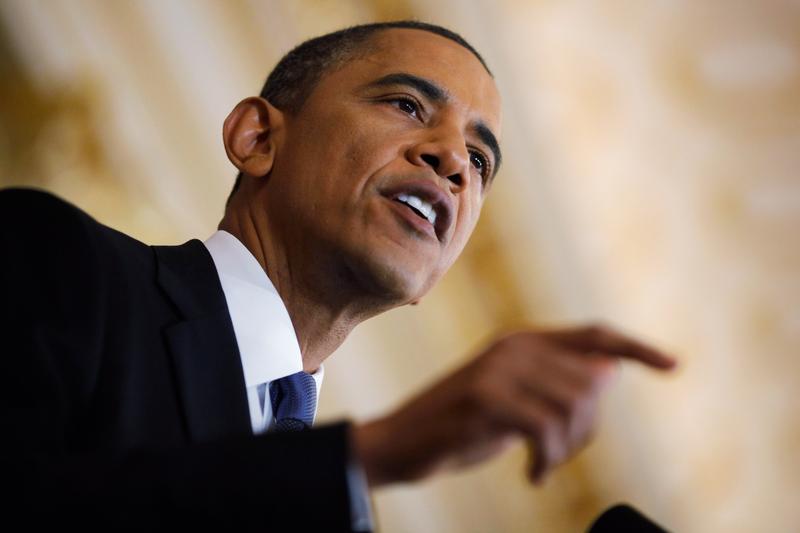
President Obama's speech on Middle East and North African policy at the State Department on Thursday wasn't earth-shattering. He tried to project consistency in the American approach to the domino-effect uprisings taking place all over the region. The President made an effort by using traditional metaphors insisting that the Arab spring is rooted in fundamental American values. Here are a few takeaways hidden in the pretty language:
1. "The Arab Spring" is as American as Apple Pie
President Obama firmly stationed the uprisings sweeping across North Africa and the Middle East as in the American interest. Citing the Boston Tea Party, the Civil War and Rosa Parks, the president made an effort to frame the narrative of change as familiar, non-threatening and welcome. "We have embraced the chance to show that America values the dignity of the street vendor in Tunisia more than the raw power of the dictator." Translation: On paper, we've been on your side all along. At the same time, the president acknowledged the gap between that ideal and the reality, and he used this opportunity to underline a shift that he began two years ago with his first speech directed at the region, in Cairo. "A failure to change our approach threatens a deepening spiral of division between the United States and Muslim communities." Here the President presented his idea of a consistent approach: One that opposes violence repression and favors economic and political reform.
2. If countries transition to "democracy," they will be rewarded
The major announcement of the speech was that the U.S. will forgive $1 billion in Egypt's debt and will offer the country another $1 billion in borrowing to be used for economic growth. The president outlined a number of economic investment programs for Tunisia and Egypt. It's not about aid, it's about trade: "We think it's important to focus on trade, not just aid; and investment, not just assistance."
3. A few points on Israel and Palestine
U.S. policy is never crystal clear, ever, regarding this issue, but the President made a few point in advance of Israeli Prime Minister Netanyahu's visit Friday. First off, it's not the burden of the U.S. to fix it: "Ultimately, it is up to Israelis and Palestinians to take action. No peace can be imposed upon them, nor can endless delay make the problem go away." Secondly, Obama supports two states divided along 1967 lines with mutually agreed swaps--which means he expects concessions from Israel. He even used the word "occupation." On the other hand, the U.S. will not support Palestine at the U.N. in September when it lobbies to be recognized as an independent state (though the U.S. does support a two-state solution). And Obama was clear that the U.S. will not deal with Hamas unless it stops questioning Israel's right to exist.
4. Regional round-up
The U.S. will take a hard line on Syria: "The Syrian people have shown their courage in demanding a transition to democracy. President Assad now has a choice: he can lead that transition, or get out of the way." This was not a call for resignation, but it was a threat. Obama was much softer on Bahrain, saying the U.S. was committed to the country's security, but the government should release opponents from jail and engage in a dialogue. Obama spent only one line on Yemen--President Saleh must transfer power. Unsurprisingly Obama was critical of Iran and Libya. Egypt and Tunisia got kudos and the President was optimistic about Iraq. For Israel and Palestine see #3.
5. Anti-terrorism is no longer the focus of American action in the region
The speech was notable for how little President Obama talked about the threat of terrorism, and that is indicative of the President's new regional narrative. The assassination of Osama bin Laden was mentioned of course, but it played second fiddle to the Arab spring. "By the time we found bin Laden, al Qaeda's agenda had come to be seen by the vast majority of the region as a dead end, and the people of the Middle East and North Africa had taken their future into their own hands."